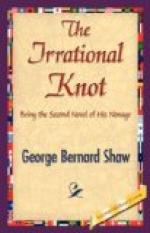In the days of The Irrational Knot I had not learnt this lesson; consequently I did not understand the British peerage, just as I did not understand that glorious and beautiful phenomenon, the “heartless” rich American woman, who so thoroughly and admirably understands that conscience is a luxury, and should be indulged in only when the vital needs of life have been abundantly satisfied. The instinct which has led the British peerage to fortify itself by American alliances is healthy and well inspired. Thanks to it, we shall still have a few people to maintain the tradition of a handsome, free, proud, costly life, whilst the craven mass of us are keeping up our starveling pretence that it is more important to be good than to be rich, and piously cheating, robbing, and murdering one another by doing our duty as policemen, soldiers, bailiffs, jurymen, turnkeys, hangmen, tradesmen, and curates, at the command of those who know that the golden grapes are not sour. Why, good heavens! we shall all pretend that this straightforward truth of mine is mere Swiftian satire, because it would require a little courage to take it seriously and either act on it or make me drink the hemlock for uttering it.
There was the less excuse for my blindness because I was at that very moment laying the foundations of my high fortune by the most ruthless disregard of all the quack duties which lead the peasant lad of fiction to the White House, and harness the real peasant boy to the plough until he is finally swept, as rubbish, into the workhouse. I was an ablebodied and ableminded young man in the strength of my youth; and my family, then heavily embarrassed, needed my help urgently. That I should have chosen to be a burden to them instead was, according to all the conventions of peasant lad fiction, monstrous. Well, without a blush I embraced the monstrosity. I did not throw myself into the struggle for life: I threw my mother into it. I was not a staff to my father’s old age: I hung on to his coat tails. His reward was to live just long enough to read a review of one of these silly novels written in an obscure journal by a personal friend of my own (now eminent in literature as Mr.




